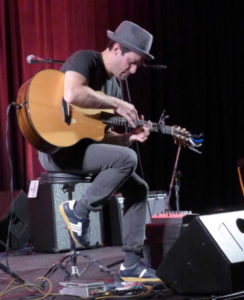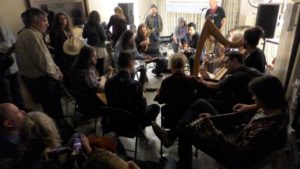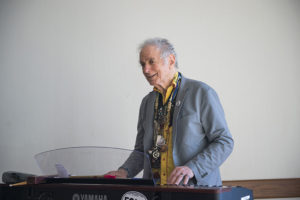Photos by Ebet Roberts

One of the many wonderful things about the folk community is its inclusiveness—not just black or white or choice of entrée, but for instruments as well. Virtuoso guitarist Trace Bundy proved that point when he switched back and forth between carbon-fiber and wood guitars (where his unusual two-handed fretwork boggled the mind), but his performance depended heavily on a MIDI machine, the use of which he explained to his audience as he went along. In one particularly complicated example of MIDI magic, “Joy and Sorrow,” he tuned the carbon-fiber to D-minor, the McPherson to D-major and swapped guitars back and forth while the previous few passes were playing. We asked sound engineer Bob Safranek what he thought about electronic wizardry like the MIDI, and he said, “It’s a way to express what the artists are trying to get out. Think of it as another instrument.”

We’ve known them for a couple of years, but finding them at FAI was a surprise—except for the inclusiveness thing. With a Tina-Turner-like frontwoman, rockers Southern Avenue seemed to smile a little more broadly during their rare ballads, but the crown went wild for their Memphis rock and roll, as well they should.
We stopped by Sam Reider and the Human Hands for their official showcase, which incorporated eerie lead-ins to the eclectic flavors of Eastern European, Balkan, gypsy, Irish, bluegrass, Spanish and you-name-it folk music; inclusion’s the word here. Every musician in this group takes multiple solos, reminding us of their individual virtuosity, but together they create a sound unlike any other. The five instruments can dwindle down to one—occasionally in scratchy dissonance—pause a beat, then erupt into a symphonic explosion of glorious harmony. At one point I pictured a stop-action image of a single reedy stalk magically bursting into a vibrant, intricate flower. For those of us who have gotten a little lazy listening to a diet of 12-bar blues or Adele, this music will give your music appreciation muscles a workout, and you’ll thank Sam Reider and the Human Hands.
Upstairs, Suzanne Slair and her country/Southern rock group brought us safely back to earth. The fun vocalist looks punk, sounds beer-bar and thinks home values, as we found in her song “Safe Harbor.” Tender singer/songwriter Chuck McDermott wowed a small crowd with songs like “Gin and Rosewater,” an example of his knack for painting fresh images with sure strokes.
As if changing artists every 30 minutes or every hour weren’t fast enough, Folk Alliance loves in-the-round rooms, where two, three or four artists alternate songs. Jordy Baizan, whom we’d encountered last year, continued to impress with his new song “Lazy [means I get to spend more time with you],” yet another reminder to us that slow isn’t such a bad thing. In the same room, the Wide Open, a husband-and-wife duo, changed the pace with “Love’s A Losing Game,” although it didn’t look like that concept arose from their own partnership. Singer/songwriter Tim Grimm is anything but grim, and his songs tell stories to both warm and break the heart.
Caves and Clouds, another couple-duo and FAI first-timers wowed us with their spot-on songs and the ethereal vocals of E.W. Harris, whose vocal range may start in a cave on earth, but who hits about the same heavenly highs as partner Jo Kroger; Harris wields operatic tremolos to die for. The songs are cool, with great imagery and sly humor, too. We’re planning to see more of them in their home town of New York.
Not that everything is bliss at Folk Alliance. I’ve come to the conclusion that any line repeated more than ten times in any given song should be taxed, like an overweight eighteen-wheeler: it’s an unwarranted burden on the public.
Neither admonition applies to true-blooded Irishman Daoiri Farrell, whose voice epitomizes Ireland’s deserved reputation for singers. A born storyteller, the bouzouki player’s songs create a landscape of their own, and his hysterical patter between songs brings us back to our own lives, cheerfully.
 We almost packed it in at 3 AM, but ran into David Amram in the crowded hall. The 87-year-old was headed for a jam in the Oklahoma Room, and we decided to tag along. Squeezing in, we found Chris Lee Becker leading a not-ready-for-bedtime crowd in a scattershot set list with an equally diverse group of instruments, including David Amram’s pennywhistle and a harp—back to inclusion in folk music. Becker’s own song stood out both to me and the crowd, which joined in enthusiastically, singing “Four clichés in a row, and you’ve got a country song…Folk singers don’t die young, Lord, they live too long.”
We almost packed it in at 3 AM, but ran into David Amram in the crowded hall. The 87-year-old was headed for a jam in the Oklahoma Room, and we decided to tag along. Squeezing in, we found Chris Lee Becker leading a not-ready-for-bedtime crowd in a scattershot set list with an equally diverse group of instruments, including David Amram’s pennywhistle and a harp—back to inclusion in folk music. Becker’s own song stood out both to me and the crowd, which joined in enthusiastically, singing “Four clichés in a row, and you’ve got a country song…Folk singers don’t die young, Lord, they live too long.”

The two-hour jam resembled every other folk gathering I’ve ever experienced: a combination of social and political protest, revival meeting and comedy hour. Just folks at Folk Alliance, singing at 4 AM and looking forward to tomorrow, today.
—Suzanne Cadgène





















Be the first to comment!